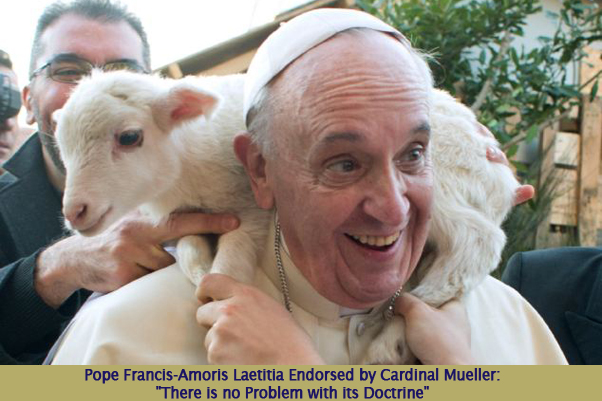THE ISSUE OF THE APOSTOLIC EXHORTATION, Amoris Laetitia is still in the air. However, this morning it took a sharp turn towards closure; it did so for two reasons. One, Pope Francis punctuated his push for pastoral theology both clarifying his intent and strengthening its dynamism by tying it to the issue of “authority”, authentic Christ-like authority. The linking of pastoral theology to authority by the pope was complimented by Cardinal Mueller, the Prefect for the Sacred Congregation of Faith, who also spoke out clearly, two days earlier, on the doctrinal message and pastoral dimensions of the document, Amoris Laetitia.
AA
PASTORAL THEOLOGY AND CHRIST-LIME AUTHORITY
This morning January 10, 2017 Pope Francis gave a homily on authority during morning Mass at Casa Santa Martain in which he stated
“Authority, if true, will enter hearts, like Jesus’ did. But if it’s just formal, it won’t ….”
To clarify his meaning the pope juxtaposed top down authority imposed by means of bureaucratic position (like that exercised by the Pharisees) to “real” authority acquired by affinity of hearts (like that exercised by Jesus, the Good Shepherd). To further clarify his meaning, Francis examined three characteristics of “real authority”.
He begins by noting that the scriptures reveal people were amazed at the teaching of Jesus; they were “amazed” because He taught “as one with authority and not as their scribes” (Matt 7:29). Francis explains that the teaching of the legalistic Pharisees did not enter the hearts of those who heard it. True authority penetrates into the heart. Like the Pharisees, Jesus did not neglect any point of the law, yet He taught it in such a way that His words entered into people’s hearts.
A priest who teaches with true authority is able to penetrate hearts because he is a servant of rather than a lord over his flock. It is servant-leadership that confers genuine authority.
Pharisees teach, but they do not touch hearts because they are too “clerical”, too concerned about their positions of authority. This type of priest, Francis emphasized, is infected with a
“…psychology of princes: ‘We are the masters, the princes, and we teach you. Not service: we command, you obey.’ And Jesus never passed Himself off like a prince: He was always the servant of all, and this is what gave Him authority.’”
Moreover, a true servant leader is in close relationship with those whom he serves.
“Jesus did not have an allergy to the people: touching the lepers, the sick, didn’t make Him shudder.”
The Pharisees, however, assumed a position of superiority. A Pharisees eshews “the poor people, the ignorant,” they liked to parade about the piazzas, in soutains and genteel garb.
“They were detached from the people, they were not close [to them]; Jesus was very close to the people, and this gave authority. Those detached people, these doctors, had a clericalist psychology: they taught with a clericalist authority – that’s clericalism.”
Quoting Blessed Paul VI (Evangelii nuntiandi 48), Pope Francis made clear: “One sees the heart of a pastor who is close [to the people].”
In addition to service and closeness to his people, a man with authority is “coherent‘.
Coherence distinguishes the authority of the scribes from that of Jesus. That is, Jesus’ life corresponds to His words. A coherent shepherd lives what he preaches as Jesus “lived what He preached.” A clericalist is more intent on looking good and dazzling people with his brilliance while assuming a posture of superiority. Consequently, they are not coherent; their personality is divided on a central point about which Jesus warned His disciples:
“But, do what they tell you, but not what they do’: they said one thing and did another. Incoherence. They were incoherent. And the attitude Jesus uses of them so often is hypocritical. And it is understood that one who considers himself a prince, who has a clericalist attitude, who is a hypocrite, doesn’t have (true) authority! He speaks the truth, but without authority. Jesus, on the other hand, who is humble, who is at the service of others, who is close, who does not despise the people, and who is coherent, has authority. And this is the authority that the people of God senses.”
A priest with authority is a servant that is close to his people, a servant who lives a coherent life. Like Jesus, he is a good shepherd, a good pastor. A pastor knows the truths of the faith but is able to concertize them in love as a shepherd having authority over his flock because he knows them, serves them and coherently loves them. It is the pastoral dimension of his formation that confers the fullness of authority necessary for his office, necessary for success as a pastor.
jyt
THE PASTORAL DIMENSION OF AMORIS LAETITIA
To grasp Amoris Laetitia, it must be interpreted in this light, in the light of pastoral theology deeply rooted in the wisdom and truths of the faith, in the constant teaching of the Church, as Francis points out twice in paragraph 300 of Amoris Laetitia“
“Priests have the duty to “accompany [the divorced and remarried] in helping them to understand their situation according to the teaching of the Church”
“This discernment can never prescind from the Gospel demands of truth and charity, as proposed by the Church.”
Clearly, the issue at hand is a pastoral one, viz., how to uphold the teachings of the Church in the modern world, a world void of a sense of the sacred, a world in which divorce and remarriage are common place, a world in which the sons and daughters of the Church have been inculturated without their awareness of its effects. Since the whole process is about salvation and pastoral accompaniment during an Hour of Mercy, pastors are being nudged into being more pastorally minded. This is clear to the Archbishop of Dublin, to the Prefect for the Sacred Congregation of the Faith, and to many other cardinals and bishops who stand with the pope in opposition to Cardinal Burke and the misinformed lay men who have lined up to bat for him against the pope.
“Now I beseech you, brethren, to mark them who make dissensions and offences contrary to the doctrine which you have learned, and avoid them. For they that are such, serve not Christ our Lord, but their own belly; and by pleasing speeches and good words, seduce the hearts of the innocent. For your obedience is published in every place. I rejoice therefore in you” (Romans 16:17-19).
Men causing dissension are all misreading the document, which is clear enough to many others, and to the New Era staff. Thus, according to Cardinal Mueller:
“It is a misreading” of the Pope’s exhortation to say it has been the cause of polemics.”
“The Church has no power to change the Divine Law”…not even a pope or council can do that.”
Some, like those at Church Militant and The World Over, like to point out that there is confusion and therefore implicitly (in Arroyo’s case – explicitly) take the side of Cardinal Burke. It must be admitted: Yes, there is confusion, but that does not mean that Cardinal Burke is correct in his assessment of Amoris Laetitia and that the pope must answer in some way to him.
There is confusion because men like Mr. Arroyo, and ultra-traditionalist or liberal bishops are manufacturing confusion. In a response to New Era’s third article on the issue (Attack on Pope Francis: Supposed Loyal Catholics Distort Information Defame Pope), Dr. Marzak pointed out that there is always confusion where there is disobedience and pride, when people pursue their own path rather than submit to legitimate magisterial authority in humble obedience. He pointed out that it is liberal bishops and schismatic seda vacantists who are causing the confusion; they are often supplemented by well meaning but over-zealous laymen who misunderstand pastoral theology and the relationship between the practical and speculative intellect as examined in Article One. In response to a comment pertaining to Article Three in the series on Amoris Laetitia, Dr. Marzak stated.
“Watch what will happen this year when Cardinal Mueller begins to deal with them (those liberal and ultra-conservative bishops causing confusion). Now that the Church is fully aware of their aberrant polices the CDF (Congregation for the Doctrine of the Faith) will act – let’s watch and see.
“It is just not liberals causing confusion, how do you account for pious sedivacantists who ordain their own bishops contrary to what the Church teaches; they are causing confusion too (and most of it).”
“Nonetheless, it is not confusion that is the issue, it is pride leading to willful disobedience which the self-righteous perpetrators then try to mask in confusion to cover their errancy by instead attacking the papacy as if they were some type of holy body constituted to lead the church instead of the See of Peter.”
In this regard, Cardinal Mueller has spoken out, and spoken out clearly. In a January 8, interview with tgcom24, Cardinal Mueller objected to Cardinal Burke and those “Princes of the Church” who publicly challenged the pope by questioning the doctrinal accuracy of Amoris Laetitia. According to Cardinal Mueller, the Church’s highest ranking doctrinal official, the prefect for the Sacred Congregation of the Faith, according to Cardinal Mueller: Amoris Laetitia is “very clear”. This has been New Era’s position form the beginning of the controversy, so much so that the staff here has been in a continual quandary over Cardinal Burke and Raymond Arroyo’s failure to “get it” speculating that the problem might be either a clerical error having to do with authority or a failure to appreciate the fine differences between the intellectual work of pastoral theology vis a vis dogmatic theology. Now that Cardinal Mueller has vociferously supported the clarity of the document, the staff here is relieved.
Highlighting the pastoral dimension of Amoris Laetitia, Cardinal Mueller stressed that it is Pope Francis’ desire that priests take time
“…to discern the situation of … persons living in an irregular union — that is, not in accordance with the doctrine of the church on marriage — and asks for help for these people to find a path for a new integration into the church according to the condition of the sacraments (and) the Christian message on matrimony.”
Cardinal Mueller clearly understands the difference between pastoral and dogmatic theology and how they intersect; consequently he sees clarity in the document:
“In the papal document, he said, “I do not see any opposition: On one side we have the clear doctrine on matrimony (dogmatic), and on the other the obligation of the church to care for these people in difficulty (pastoral).”
Cardinal Mueller evidently understands Amoris Laetitia is a “call for the pastoral accompaniment of people who are divorced and civilly remarried or who are living together without marriage.
Concerning the doctrinal clarity of the document, Mueller told the Italian television network:
“A possible fraternal correction of the pope seems very remote at this time because it does not concern a danger for the faith.”
We hope this is clear enough. According to the highest ranking doctrinal official in the Catholic Church; AMORIS LAETITIA DOES NOT CONCERN A DANGER FOR THE FAITH.”
Further, in response to a query which asked are the divorced-and-remarried in some cases permitted to receive the Eucharist “without the need to change their way of life” Cardinal Mueller responded:
“If Pope Francis’ exhortation “had wanted to eliminate such a deeply rooted and significant discipline, it would have said so clearly and presented supporting reasons,”
Cardinal Mueller is not confused, nor are score of other bishops, nor is the staff at New Era. As Dr. Marzak has previously pointed out, the confusion is being caused, on the one hand, by disobedient liberal bishops such as the one in San Diego and, on the other hand, by far right leaning bishops and churchman nearing schism or already in schism. Confusion emanating from diverse poles of the theological spectra helps generate more confusion among the larger body of sheep and lambs. The confusion is not coming from either Pope Francis or Amoris Laetitia; the confusion is rooted in clericalism, intellectual arrogance, liberal moral weakness (concupiscence and irascibility) that blinds and, above all else, it is rooted in disobedience and pride.
No where does the document Amoris Laetitia admit people living in mortal sin to receive the sacraments. What the Pastoral Exhortation does encourage, as Cardinal Mueller correctly points out is:
“A process of (pastoral) discernment, (that), might eventually lead to a determination that access to the sacraments is possible.”
If its detractors better understood and appreciated the pastoral dimensions of theology and the extreme difficulties, sacrifice and self-giving pastoral theology demands; if they understood what Francis means by “authentic authority”, they might “get it”. Some seem more intent on running the Church like a police state, a state in which they can comfortably sit back and play the judge as if God were some type of task master watching closely every day to espy and root out all errors rather than a God of LOVE who humbles Himself, who abases Himself to become little like his flock in order to tenderly serve, love and nurture them by knowing their names and sharing their lives, their pains, joys, sorrows and tribulations and by confirming His life to the doctrine of His Cross (coherence).
It is too easy to play the judge; it costs nothing but an easy arm-chair accompanied by good cuisine and an ever watchful eye always ready to catch a sinner and even a pope in error. In this they feel self-satisfied and accomplished. This might be dogmatic theology, but without love and authentic authority it fails even at that and it is certainly not pastoral theology, the theology of the Good Shepherd” who lays down his life for his sheep. This is the type of shepherd Francis is endeavoring to be, the type of shepherds he is calling the priests of the Catholic Church to become.







